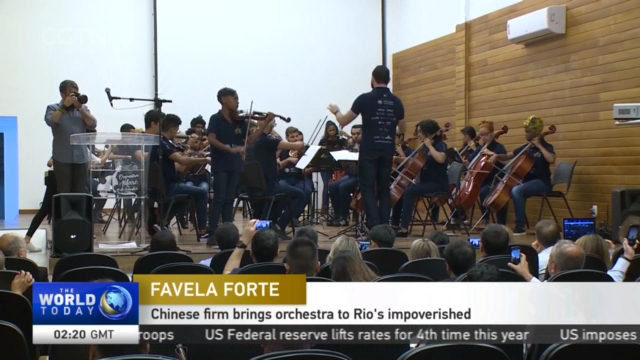
11:58, 20-Dec-2018
Favela Forte: Chinese firm brings orchestra to Rio's impoverished
Updated
11:53, 23-Dec-2018
02:53

China is working to reduce poverty in other countries. And that's music to Brazil's ears. CGTN's Lucrecia Franco explains.
Mozart this is what the Mare Orchestra of Tomorrow's elite musicians chose to play at the inauguration of their first school in one of Rio de Janeiro's most violent shantytowns. Mare is the name of a complex of 16 favelas, home to some 140-thousand people. Military occupations and shootouts are common in this crime-ridden area, dominated by rival drug gangs. State Grid Brazil Holding's president, Cai Hongxian, unveiled the school's plaque. He said investments go hand in hand with social change.
CAI HONGXIAN PRESIDENT, STATE GRID BRAZIL HOLDING "Try to help the people in a country of a bright future so that is why we selected this project."
The orchestra's school is a dream come true for director Carlos Prazeres. In addition to this theatre, it will have nine acoustically-adapted classrooms for rehearsals.
CARLOS EDUARDO PRAZERES ORCHESTRA DIRECTOR "You can be sure that music touches their souls and they are able to escape drugs and violence. They discover that they can dream, that they can be whoever they wish, not just musicians."
Since the musical project was started by State Grid in 2011, it has expanded rapidly.
LUCRECIA FRANCO RIO DE JANEIRO "Thirty-five hundred kids, from ages four to 20 are involved in the project that helps them not just to develop musical skills but also focus on their futures."
Gabriel, a gifted viola player, says the orchestra gave him a profession.
GABRIEL FARIAS VIOLA PLAYER "It changed my life, it brought friendship, patience to study, better grades and it opened a door. I always wanted to be a musician, but I didn't have an opportunity, which is something the orchestra gave me."
Juliana Oliveira, a second violinist, has other plans.
JULIANA OLIVEIRA PRINCIPAL SECOND VIOLINIST "I want to be a music producer and combine it with teaching, so I can give classes. So, it's not that I want to play the violin, but it's related to music."
The school cost more than 600-thousand dollars and was mostly financed by State Grid Brazil which also sponsors the orchestra`s operation. Now plans include Sunday concerts as a relief from the favela's violence.
Lucrecia Franco, CGTN, Rio de Janeiro.

SITEMAP
Copyright © 2018 CGTN. Beijing ICP prepared NO.16065310-3
Copyright © 2018 CGTN. Beijing ICP prepared NO.16065310-3